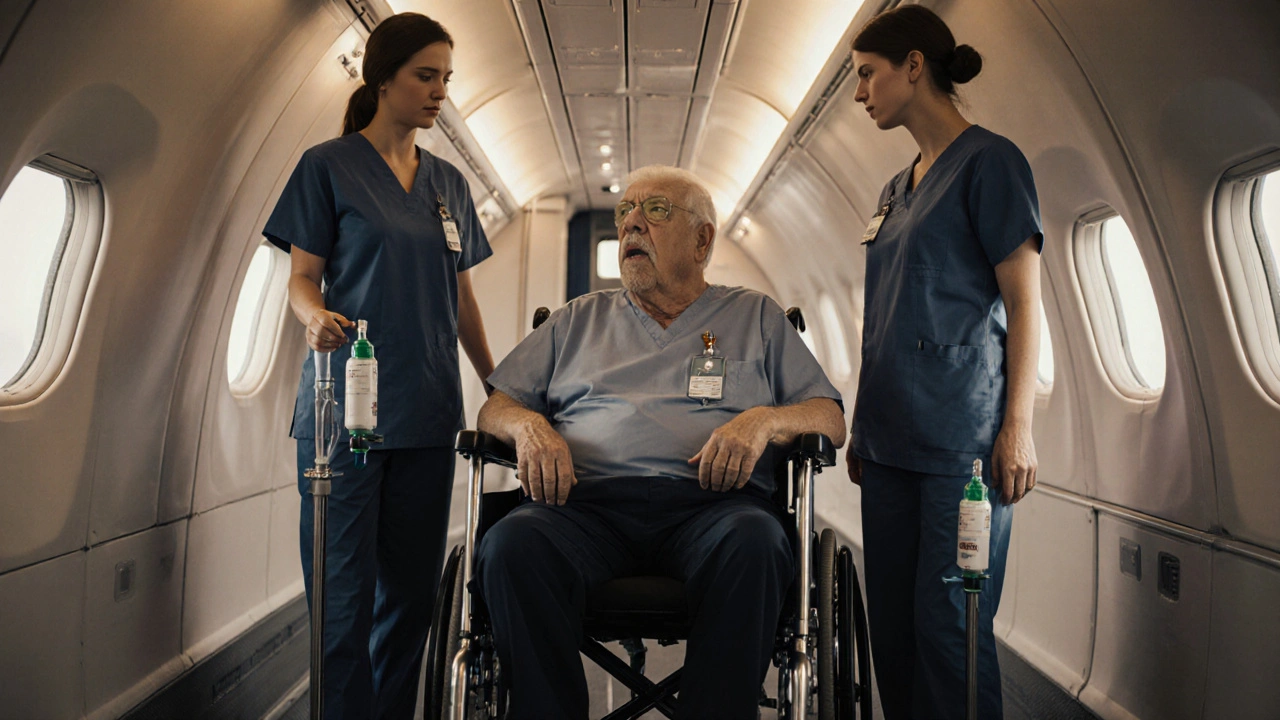When you or a loved one needs to travel for medical care - whether it’s a long-distance transfer after surgery, a repatriation from abroad, or a non-emergency move to a specialized clinic - medical escort services can make all the difference. But here’s the real question: does your insurance cover it? Most people assume if they have health insurance, they’re covered. That’s not always true. In fact, many policies leave big gaps when it comes to medical escort services, leaving families scrambling for cash at the worst possible time.
What Exactly Is a Medical Escort Service?
A medical escort service isn’t just a taxi with a nurse. It’s a specialized transport system designed for people who can’t travel safely on their own due to illness, injury, or disability. These services include trained medical personnel - like nurses, paramedics, or respiratory therapists - who accompany patients during ground, air, or even commercial flight transport. They monitor vital signs, administer medications, manage oxygen tanks, and handle emergencies mid-travel.
Think of it like this: if you’re recovering from a stroke and need to fly from Florida to California for rehab, a regular airline won’t help. But a medical escort service will send a team with a stretcher, portable ventilator, and a nurse trained in post-stroke care. They’ll book the flight, handle wheelchair transfers, and stay with you until you’re safely handed off at the destination hospital.
Why Most Health Insurance Plans Don’t Cover This
Traditional health insurance - like Medicare, Medicaid, or employer-based plans - was built for care within a hospital or doctor’s office. They pay for treatments, surgeries, and medications. But transport? That’s a gray area. Most plans only cover ambulance rides to the nearest ER. Once you’re stable, they consider you “out of emergency mode.”
For example, Medicare Part B might pay for an ambulance to take you from home to the hospital. But if you need to fly 2,000 miles to a specialist center? That’s considered “non-emergency transportation,” and it’s excluded. Even if your doctor writes a letter saying it’s medically necessary, Medicare won’t cover it. Same goes for most private insurers. They’ll say it’s “not medically necessary” unless you’re in active cardiac arrest or bleeding out.
Here’s the kicker: some insurers will cover medical transport only if it’s arranged by the hospital and deemed “medically necessary” by their internal review board. And even then, they often cap the amount they’ll pay - say, $5,000 - which barely covers a commercial flight with a nurse, let alone a private air ambulance.
What’s Usually Covered - And What’s Not
Let’s break it down plainly. If you’re lucky, your insurance might cover:
- Ground ambulance transport to the nearest facility
- Inter-facility transfers within the same state (if approved in advance)
- Some limited air transport if you’re in critical condition and no ground option exists
But here’s what almost never gets covered:
- Non-emergency long-distance travel for elective care (like going to a better rehab center)
- Medical escorts on commercial flights (even if you’re on oxygen or need IV drips)
- Repatriation after getting sick overseas
- Accompanying family members - even if they’re the only ones who can care for you
- Specialized equipment like portable ventilators or cardiac monitors during transit
One real case: a 72-year-old woman in Ohio needed to travel to Mayo Clinic for a rare cancer treatment. Her Medicare plan paid for her chemotherapy but refused to cover the $12,000 medical escort flight. She had to sell her car to pay for it.

Travel Insurance: The Hidden Lifeline
If your health insurance won’t cover it, your best bet might be travel insurance - but only if you bought the right kind. Most standard travel insurance policies cover trip cancellations, lost luggage, or emergency medical treatment abroad. But very few include medical escort services unless you specifically pay for medical evacuation coverage.
Good medical evacuation coverage includes:
- Transportation to the nearest adequate medical facility
- Repatriation back to your home country
- Medical escort during flight (nurse or paramedic onboard)
- Coordination with local hospitals and airlines
Companies like Allianz, World Nomads, and GeoBlue offer this as an add-on. But here’s the catch: you have to buy it before you leave. If you get sick overseas and then try to buy coverage, you’re out of luck. Also, some policies cap evacuation benefits at $50,000 - which sounds like a lot until you realize a private air ambulance from Europe to the U.S. can cost $75,000.
One traveler in Thailand had a severe allergic reaction. His travel insurance with medical evacuation kicked in. The company flew him to Singapore with a nurse, then arranged a private jet back to Canada. Total cost: $89,000. His policy paid $50,000. He still owed nearly $40,000.
Supplemental Insurance and Medical Transport Programs
Some insurers offer supplemental plans specifically for medical transport. For example:
- Medicare Advantage Plans: Some offer limited non-emergency transport benefits - but only within a 50-mile radius and only for doctor appointments.
- Medicaid Waiver Programs: In some states, Medicaid can cover non-emergency medical transport for low-income seniors or disabled individuals - but you have to apply separately.
- Private Medical Transport Memberships: Companies like MedJet and AirMedCare Network offer annual memberships. For $300-$800 a year, you get unlimited medical evacuations worldwide, with a nurse on board, no questions asked. No pre-approval needed. Just call, and they fly you.
These memberships aren’t insurance - they’re more like a rescue club. You pay upfront, and in return, you get guaranteed transport. No denials. No paperwork. Just a phone call when you’re in trouble.

How to Check If You’re Covered
Don’t guess. Don’t assume. Do this:
- Call your health insurance provider. Ask: “Do you cover non-emergency medical transport, including air or ground escort services?”
- Request a copy of your policy’s “Benefits Summary” or “Evidence of Coverage.” Look for sections labeled “Transportation,” “Non-Emergency Medical Transport,” or “Medical Evacuation.”
- If you have travel insurance, check your policy documents for “Medical Evacuation” coverage. Look for dollar limits and geographic restrictions.
- Ask your doctor or hospital social worker. They often know which services are covered and can help you appeal a denial.
Pro tip: Get everything in writing. If you’re told “yes,” ask for an email confirmation. If you’re told “no,” ask for the exact policy clause that denies it. That’s your ammunition if you need to appeal.
What to Do If You’re Denied Coverage
Denials happen. A lot. But you’re not powerless.
- Appeal the decision. Most insurers have a formal appeals process. Submit your doctor’s letter, medical records, and any proof that the transport is medically necessary.
- Ask for a peer-to-peer review. Some insurers will let your doctor talk directly to their medical director. This works more often than you think.
- Look for nonprofit aid. Organizations like the American Cancer Society or local United Way chapters sometimes help with transport costs.
- Consider crowdfunding. Platforms like GoFundMe have helped thousands of families cover medical transport costs when insurance fell short.
One woman in Texas used GoFundMe to raise $15,000 for her mother’s flight to a specialized heart center. She got donations from neighbors, church members, and strangers who read her story. It wasn’t perfect - but it saved her mom’s life.
Bottom Line: Plan Ahead
Medical escort services aren’t a luxury - they’re a necessity for many. But they’re also one of the most expensive things insurance rarely pays for. The only way to avoid a financial crisis is to plan before you need it.
- If you’re over 65 or have a chronic condition, look into a medical transport membership.
- If you travel internationally, buy travel insurance with medical evacuation - and make sure the limit is at least $100,000.
- If you’re helping an aging parent, talk to them now. Don’t wait until they’re sick.
Insurance won’t always save you. But being prepared? That can.
Does Medicare cover medical escort services?
Medicare rarely covers medical escort services. It pays for emergency ambulance rides to the nearest hospital, but not for non-emergency transport, long-distance transfers, or flights with medical staff. Even if your doctor says it’s necessary, Medicare considers it outside its coverage scope.
Does travel insurance cover medical escort flights?
Only if you purchased a policy with medical evacuation coverage - and even then, only if you bought it before you got sick. Standard travel insurance won’t cover it. Look for policies that include repatriation and onboard medical personnel. Limits often range from $50,000 to $250,000.
Can I use my health savings account (HSA) to pay for medical escort services?
Yes, if the service is deemed medically necessary by a doctor, you can use HSA funds to pay for medical escort services. This includes ground and air transport with trained medical staff. Keep your doctor’s note and receipt - you may need to prove it was for qualified medical expenses.
What’s the difference between a medical escort and an air ambulance?
An air ambulance is a plane equipped like a flying ICU - it has advanced life support, a full medical team, and can handle critical patients. A medical escort usually travels on a commercial flight with a nurse or paramedic who monitors the patient and handles basic care. Air ambulances are for emergencies. Medical escorts are for stable patients who can’t fly alone.
Are medical escort services covered for international travel?
Most U.S. health insurance plans don’t cover international medical transport. Travel insurance with medical evacuation is your best option. Some policies cover repatriation to your home country, while others only get you to the nearest adequate facility. Always check the geographic limits before you travel.
How much does a medical escort flight cost?
Costs vary widely. A commercial flight with a medical escort can range from $3,000 to $12,000, depending on distance and care level. A private air ambulance with full ICU capabilities can cost $25,000 to $100,000+ - especially for international trips. Always get a written quote before booking.
